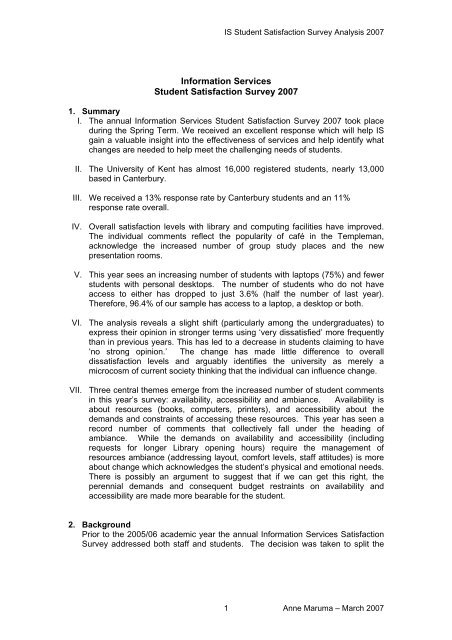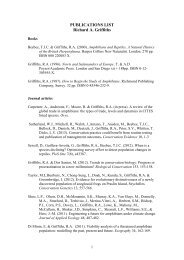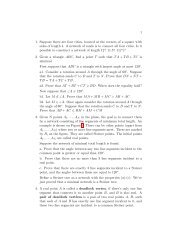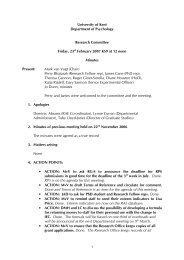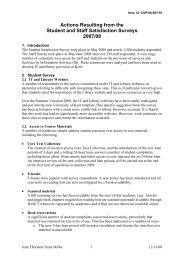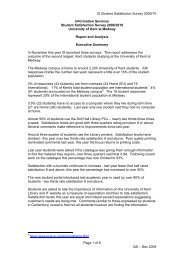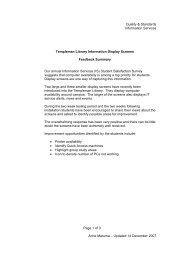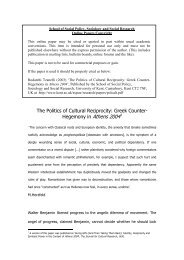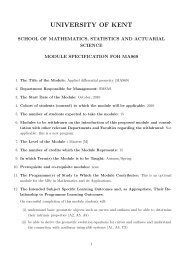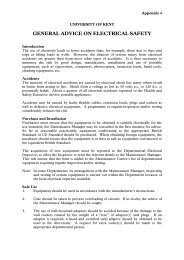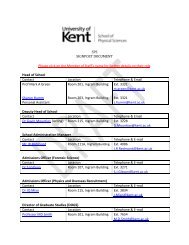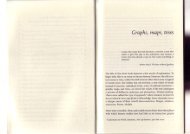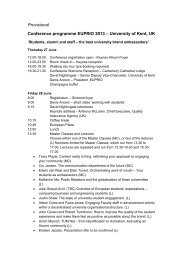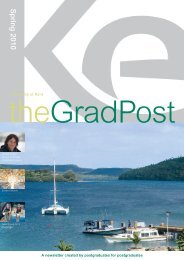IS Student Satisfaction Survey - Report - University of Kent
IS Student Satisfaction Survey - Report - University of Kent
IS Student Satisfaction Survey - Report - University of Kent
Create successful ePaper yourself
Turn your PDF publications into a flip-book with our unique Google optimized e-Paper software.
<strong>IS</strong> <strong>Student</strong> <strong>Satisfaction</strong> <strong>Survey</strong> Analysis 2007<br />
Information Services<br />
<strong>Student</strong> <strong>Satisfaction</strong> <strong>Survey</strong> 2007<br />
1. Summary<br />
I. The annual Information Services <strong>Student</strong> <strong>Satisfaction</strong> <strong>Survey</strong> 2007 took place<br />
during the Spring Term. We received an excellent response which will help <strong>IS</strong><br />
gain a valuable insight into the effectiveness <strong>of</strong> services and help identify what<br />
changes are needed to help meet the challenging needs <strong>of</strong> students.<br />
II. The <strong>University</strong> <strong>of</strong> <strong>Kent</strong> has almost 16,000 registered students, nearly 13,000<br />
based in Canterbury.<br />
III. We received a 13% response rate by Canterbury students and an 11%<br />
response rate overall.<br />
IV. Overall satisfaction levels with library and computing facilities have improved.<br />
The individual comments reflect the popularity <strong>of</strong> café in the Templeman,<br />
acknowledge the increased number <strong>of</strong> group study places and the new<br />
presentation rooms.<br />
V. This year sees an increasing number <strong>of</strong> students with laptops (75%) and fewer<br />
students with personal desktops. The number <strong>of</strong> students who do not have<br />
access to either has dropped to just 3.6% (half the number <strong>of</strong> last year).<br />
Therefore, 96.4% <strong>of</strong> our sample has access to a laptop, a desktop or both.<br />
VI. The analysis reveals a slight shift (particularly among the undergraduates) to<br />
express their opinion in stronger terms using ‘very dissatisfied’ more frequently<br />
than in previous years. This has led to a decrease in students claiming to have<br />
‘no strong opinion.’ The change has made little difference to overall<br />
dissatisfaction levels and arguably identifies the university as merely a<br />
microcosm <strong>of</strong> current society thinking that the individual can influence change.<br />
VII. Three central themes emerge from the increased number <strong>of</strong> student comments<br />
in this year’s survey: availability, accessibility and ambiance. Availability is<br />
about resources (books, computers, printers), and accessibility about the<br />
demands and constraints <strong>of</strong> accessing these resources. This year has seen a<br />
record number <strong>of</strong> comments that collectively fall under the heading <strong>of</strong><br />
ambiance. While the demands on availability and accessibility (including<br />
requests for longer Library opening hours) require the management <strong>of</strong><br />
resources ambiance (addressing layout, comfort levels, staff attitudes) is more<br />
about change which acknowledges the student’s physical and emotional needs.<br />
There is possibly an argument to suggest that if we can get this right, the<br />
perennial demands and consequent budget restraints on availability and<br />
accessibility are made more bearable for the student.<br />
2. Background<br />
Prior to the 2005/06 academic year the annual Information Services <strong>Satisfaction</strong><br />
<strong>Survey</strong> addressed both staff and students. The decision was taken to split the<br />
1<br />
Anne Maruma – March 2007
<strong>IS</strong> <strong>Student</strong> <strong>Satisfaction</strong> <strong>Survey</strong> Analysis 2007<br />
survey to target specific questions to the two groups <strong>of</strong> users. Now in its second<br />
year it is hoped the repetition <strong>of</strong> questions will give some meaningful comparison<br />
<strong>of</strong> data.<br />
3. Overview<br />
The survey invites feedback from <strong>University</strong> <strong>of</strong> <strong>Kent</strong> students across all<br />
campuses. Questions focus on services provided by <strong>IS</strong> principally in the area <strong>of</strong><br />
library and computing services. While recognizing that results are about<br />
perception and not necessarily reality they do nevertheless help focus attention<br />
on customer perception about the effectiveness <strong>of</strong> a given service. Of equal<br />
value are individual comments that can, and do, drive change needed to meet the<br />
challenging needs <strong>of</strong> students.<br />
The Drill Hall Library will be carrying out a similar survey with Medway students in<br />
mid March.<br />
4. Objectives<br />
The survey is identified, as integral to a continuous quality monitoring process by<br />
<strong>IS</strong> whose aim is to achieve best practice through quality enhancement. Without<br />
feedback it is difficult to gauge if students are satisfied with services – the<br />
different levels <strong>of</strong> satisfaction help identify improvement opportunities. Feedback<br />
helps identify changing needs in working practice and sheds light on student<br />
demands and expectations.<br />
5. Methodology<br />
The survey is web-based using the Bristol Online <strong>Survey</strong> (BOS) s<strong>of</strong>tware.<br />
Although paperless, the option exists for students needing help to telephone or<br />
visit the Helpdesk for assistance with completing the online questionnaire.<br />
6. Communication<br />
Prior to launch contact was made with C&DO, the <strong>Student</strong> Union, Estates, the<br />
Drill Hall Library and the Tonbridge Centre to avoid any clash with other survey<br />
groups. Posters, on-line announcements, student flyers, and email were used to<br />
promote the survey.<br />
7. Incentive<br />
A prize to the value <strong>of</strong> £50 is <strong>of</strong>fered as an incentive and awarded to a randomly<br />
selected student when the survey closes.<br />
8. Responses<br />
1,802 completed questionnaires have been received.<br />
9. Main Themes<br />
I. Templeman library services and facilities<br />
II. General library feedback<br />
III. Campus computing services and facilities<br />
IV. Web pages and online information sources<br />
V. <strong>Student</strong> access to personal computers<br />
10. Data Type<br />
I. Demographic<br />
II. Opinions positive/negative (closed questions)<br />
2<br />
Anne Maruma – March 2007
<strong>IS</strong> <strong>Student</strong> <strong>Satisfaction</strong> <strong>Survey</strong> Analysis 2007<br />
III.<br />
IV.<br />
Identifying hardware (open questions)<br />
General comments (optional)<br />
11. <strong>Survey</strong> Characteristics<br />
I. <strong>Survey</strong> launch 14 February, closed 8 March<br />
II. Addresses <strong>University</strong> <strong>of</strong> <strong>Kent</strong> students<br />
III. Questions build on previous survey data for comparison<br />
IV. Web-based questionnaire<br />
V. Closed questions to elicit response: Very satisfied, Satisfied, No strong<br />
opinion, Dissatisfied, Very dissatisfied, No experience<br />
VI. Four optional comment areas<br />
(a) Public PC rooms (all campuses)<br />
(b) General computing facilities (all campuses)<br />
(c) Templeman Library facilities<br />
(d) Drill Hall/Tonbridge Centre Library facilities<br />
12. Analysis<br />
The <strong>University</strong> <strong>of</strong> <strong>Kent</strong> has 15,954 registered students (1 December 2006),<br />
12,938 based in Canterbury 1 .<br />
The majority <strong>of</strong> students who responded are Canterbury based (1,721). The<br />
remaining students are based at Medway (62), Tonbridge (5), Brussels (6) and<br />
Folkestone (1).<br />
Over 80% <strong>of</strong> the students surveyed are fulltime undergraduates, and little over<br />
10% full time postgraduates. Nearly 7% are part time (undergraduates and<br />
postgraduates), with the remaining students attending Access and Diploma<br />
courses or part <strong>of</strong> Erasmus (European Community Action Scheme for the Mobility<br />
<strong>of</strong> <strong>University</strong> <strong>Student</strong>).<br />
Although 115 part time students responded (up from 108 last year) this segment<br />
<strong>of</strong> the student population remains under-represented.<br />
The majority <strong>of</strong> students are using XP as their Operating System. 2.9% are using<br />
Vista, (launched just prior to the survey). This is a similar percentage identified in<br />
the recent Study Bedroom Services <strong>Survey</strong>. 75 students or 4.3% <strong>of</strong> our sample<br />
are Mac users, (double that <strong>of</strong> 2006).<br />
I. Library Services - Templeman<br />
Library Visits, Study Materials, Services and Facilities<br />
Over 96% <strong>of</strong> students use the Templeman, with just over 76% using it<br />
more than once a week. The frequency <strong>of</strong> use shows an increase on the<br />
figures for 2005/6 with 52% using the Library three times a week or more<br />
(up from 48% in 2005/6) and 23% using it less than once a week (down<br />
from 27% in 2005/6).<br />
77% <strong>of</strong> users said they were satisfied or very satisfied with study<br />
materials, services and facilities. 10% expressed dissatisfaction and 13%<br />
expressed no strong opinion.<br />
1 https://www.kent.ac.uk/registry-local/spdo/snpl/files/ah_real3.xls<br />
3<br />
Anne Maruma – March 2007
<strong>IS</strong> <strong>Student</strong> <strong>Satisfaction</strong> <strong>Survey</strong> Analysis 2007<br />
Help & Enquiry Desk, Loan Desks and Short Loan Collection<br />
The Library Enquiry and Computing Helpdesk were this year combined<br />
and renamed the Help & Enquiry Desk. Together with the Loan Desk,<br />
satisfaction levels for customer waiting times and service quality is very<br />
high. Dissatisfaction levels across the board are exceptionally low for both<br />
service quality and waiting times (3% to 6%).<br />
Availability <strong>of</strong> books on the open shelves and waiting times to borrow<br />
material have seen slight increases in satisfaction levels but<br />
dissatisfaction is high at 29% and 24% respectively. Analysing these<br />
results further reveal dissatisfaction is slightly higher among fulltime<br />
undergraduates.<br />
The Short Loan Collection has seen a small improvement in satisfaction<br />
levels for availability <strong>of</strong> material – overall dissatisfaction remains the same<br />
as last year (18%) but service quality has improved by 5%.<br />
An additional question this year asked students how they felt about not<br />
being able to browse the short loan collection. A three way split reveals<br />
25% want to browse, 43% have no strong opinion and 32% are satisfied<br />
with the status quo.<br />
Study Areas (comfort, availability and opening hours)<br />
There has been an increase in satisfaction levels in general while<br />
dissatisfaction levels have remained static in some areas but increased in<br />
others. Availability <strong>of</strong> study areas (student comments identify the group<br />
study areas in particular) and what are seen as limited opening hours<br />
(clearly identified by Canterbury students as the Templeman) triggered<br />
higher levels <strong>of</strong> dissatisfaction than noise, lighting or comfort.<br />
Because library opening times impact on the different groups in similar but<br />
different ways, it is worth looking at dissatisfaction levels by group:<br />
21% Fulltime undergraduates say they are dissatisfied<br />
20% Fulltime postgraduates are dissatisfied<br />
22% Part time undergraduates & postgraduates dissatisfied<br />
The overall dissatisfaction levels [see Question 13c results] are similar to<br />
last year (21%) but this year has seen a shift in emphasis from feeling<br />
dissatisfied to feeling very dissatisfied (very dissatisfied 5% last year and<br />
6% this year).<br />
Templeman Library Skills training<br />
A high number <strong>of</strong> students in our sample (54% a big increase from last<br />
year’s 40%) say they have no experience <strong>of</strong> Library Skills training. Of<br />
those who underwent training, satisfaction levels for quality and range are<br />
around 64%.<br />
Of the 54% that said they had no experience <strong>of</strong> Library Skills training the<br />
break down by student group is as follows:<br />
4<br />
Anne Maruma – March 2007
<strong>IS</strong> <strong>Student</strong> <strong>Satisfaction</strong> <strong>Survey</strong> Analysis 2007<br />
54% Fulltime undergraduates<br />
44% Fulltime postgraduates<br />
58% Part time undergraduates & postgraduates<br />
Web pages and online information services<br />
Overall satisfaction levels remain high for the usefulness <strong>of</strong> the library web<br />
pages (75%). for the usefulness <strong>of</strong> the Library web pages show a sharp<br />
rise from 53% last year to 67% this year. Those saying they have no<br />
experience <strong>of</strong> the Library web pages also shows a drop from 18% last<br />
year to 7% this year.<br />
80% <strong>of</strong> students are satisfied with using the Web Catalogue (OPAC) the<br />
8% who have expressed dissatisfaction is the same percentage as last<br />
year.<br />
For students who use electronic information sources (CD-ROM or online)<br />
satisfaction levels for ease <strong>of</strong> access remains similar to last year (around<br />
67%). However this year 32% <strong>of</strong> students say they have no experience <strong>of</strong><br />
the service - a big increase from last year’s 24%.<br />
Cross tabulating the data reveals the student group percentages who said<br />
they had no experience this year:<br />
33% Fulltime undergraduates<br />
28% Fulltime postgraduates<br />
34% Part time undergraduates & postgraduates<br />
II.<br />
User Services<br />
General level <strong>of</strong> satisfaction & preferred location <strong>of</strong> public PCs<br />
It is interesting to note that 10% <strong>of</strong> our total samples never use a public<br />
PC and 29% use them less than once a week. If we tease the data<br />
further we can see:<br />
8% Fulltime undergraduates never use a public PC and<br />
27% use them less than once a week<br />
13% Fulltime postgraduates never use a public PC and<br />
36% use them less than once a week<br />
26% Part time undergraduates/postgraduates never use a public PC<br />
and 43% use them less than once a week<br />
It is interesting to note that the Templeman remains the preferred location<br />
for Public PC rooms, with 67% preferring the location this year showing a<br />
marked increase on the 56% from last year. The most popular is Level 2<br />
Centre (in spite <strong>of</strong> there only being 6 PCs) followed by Level 2 Extension<br />
(94 PCs) and Level 3 Extension (97 PCs) 2 .<br />
2 http://www.kent.ac.uk/is/computing/students/locations/locations.html<br />
5<br />
Anne Maruma – March 2007
<strong>IS</strong> <strong>Student</strong> <strong>Satisfaction</strong> <strong>Survey</strong> Analysis 2007<br />
Among the colleges Keynes N1-4 (Room 1) is the most popular followed<br />
by Eliot (4 th Floor Study).<br />
Overall 80% <strong>of</strong> students expressed satisfaction with computing services<br />
and facilities, a slight increase over last year with fewer students<br />
registering their dissatisfaction with services.<br />
Although a small sample, Medway students expressed satisfaction (72%)<br />
and Tonbridge (63%), with just over 25% and 33% respectively,<br />
expressing no strong opinion.<br />
PC Room - comfort, opening hours, availability <strong>of</strong> PCs & printers<br />
Addressing noise, lighting and comfort, satisfaction levels are up 1% to<br />
73% but again we see a shift by undergraduates to register stronger<br />
dissatisfaction levels - the overall dissatisfaction percentage has<br />
nevertheless remained static at 13%. The overwhelming majority <strong>of</strong><br />
students say they are satisfied – the percentage <strong>of</strong> fulltime<br />
undergraduates that are very satisfied has climbed to 17% from 16% last<br />
year.<br />
Availability <strong>of</strong> computers has improved by 6%, satisfaction levels rising to<br />
62% with overall dissatisfaction levels having fallen by 2% to 23%.<br />
Printer availability satisfaction has risen by 1% to 67% but total<br />
dissatisfaction levels have doubled to 30% in a year this suggests a<br />
general shortage <strong>of</strong> printers or a printer shortages in areas where<br />
students work?<br />
Cross tabulating the data reveal that students who are the most<br />
dissatisfied use Templeman Level 2 Centre and Level 3 Extensions<br />
followed by Level 2 Extension as their preferred PC location.<br />
<strong>Student</strong>s were not asked if they had access to home printers or their<br />
preferred location to print work – these are two questions we might want<br />
to ask next year.<br />
Web Pages<br />
The majority <strong>of</strong> students are satisfied with the computing services web<br />
pages with less than 1% expressing any kind <strong>of</strong> dissatisfaction.<br />
Printed information and publications<br />
The decision was taken this year to measure the satisfaction levels <strong>of</strong> two<br />
publications both <strong>of</strong> which are made available to all students. <strong>Student</strong>s<br />
were asked to comment on other computing or library publications made<br />
available.<br />
i. Library Resource Book: <strong>Student</strong>s<br />
<strong>Satisfaction</strong> levels are high at nearly 72% among students who have<br />
seen the book. If we analyse the data a little it reveals a higher<br />
percentage <strong>of</strong> part time undergraduates (13%) who are very satisfied<br />
closely followed by 12% full time undergraduates. Dissatisfaction levels<br />
are very low across the board.<br />
6<br />
Anne Maruma – March 2007
<strong>IS</strong> <strong>Student</strong> <strong>Satisfaction</strong> <strong>Survey</strong> Analysis 2007<br />
However, 29% <strong>of</strong> our sample said they had no experience <strong>of</strong> the<br />
publication. This breaks down by student group to:<br />
29% Fulltime undergraduates<br />
26% Fulltime postgraduates<br />
31% Part time undergraduates & postgraduates<br />
ii. Computing Resource Book: <strong>Student</strong>s (Canterbury and Tonbridge)<br />
If we discount the 6% who we wouldn’t expect to see this publication<br />
the percentage with no experience is the same as the Library Resource<br />
Book (29%). <strong>Satisfaction</strong> levels are again high among those who have<br />
seen the book. The percentage <strong>of</strong> student expressing dissatisfaction<br />
was minimal at 1.5%.<br />
iii. Computing Resource Book: <strong>University</strong> <strong>of</strong> <strong>Kent</strong> at Medway <strong>Student</strong>s<br />
The sample size is too small for any meaningful understanding <strong>of</strong> the<br />
data.<br />
iv. Other computing or library publication, made available<br />
46% <strong>of</strong> our sample have used other publications, the majority<br />
expressing satisfaction.<br />
Access to a personal computer – all students<br />
A high percentage <strong>of</strong> students have access to a personal laptop and or a<br />
desktop, among the part timers it is almost 100%. Fulltime postgraduates<br />
have the highest proportion <strong>of</strong> laptops (78%). Fulltime undergraduates are a<br />
close second with 74%.<br />
With a high proportion <strong>of</strong> students having access to personal laptops and<br />
desktops it is tempting to draw conclusions that having one or the other<br />
increases dissatisfaction levels if a public PC or printer is not available. And<br />
to some extent this conclusion is probably true. Anecdotal studies show that<br />
car drivers for example, who occasionally use public transport are more likely<br />
to complain if things breakdown than the general public that use public<br />
transport every day.<br />
There is probably a relationship between increased printing dissatisfaction<br />
and the number <strong>of</strong> students who have access to a personal laptop or desktop.<br />
If we assume students work on their own computer and only want to use a<br />
university machine to print, there is an argument for dedicated printers for<br />
laptops and, or dedicated PCs used to print work from memory sticks.<br />
13. Optional Comment Area<br />
Four areas <strong>of</strong> the questionnaire invited students to share comments on different<br />
aspects <strong>of</strong> services and facilities provided by Information Services. A total <strong>of</strong><br />
1,640 responses were received, many with detailed feedback about one or more<br />
topics.<br />
Question 12 addressed public PC rooms, group study spaces, and presentation<br />
and practice rooms. Question 18 invited general comments about the computing<br />
service facilities. Question 19 asked students to comment about the services<br />
7<br />
Anne Maruma – March 2007
<strong>IS</strong> <strong>Student</strong> <strong>Satisfaction</strong> <strong>Survey</strong> Analysis 2007<br />
provided in the Templeman Library. Question 20 asked students who use the<br />
Drill Hall Library and Tonbridge Centre Library for their comments.<br />
Responses this year gave an insight into what students perceived as computer<br />
shortages. Not as in previous years, insufficient numbers, but PCs not meeting<br />
an immediate student need.<br />
In a similar but different way the comments support the Results which show that<br />
this year there is a shortage <strong>of</strong> printers. The percentage <strong>of</strong> students having<br />
access to laptops and desktops has increased. The comments reveal that<br />
students look for computers to access printers and it is their frustration at having<br />
to queue (possibly because <strong>of</strong> a broken printer) that has undoubtedly led to the<br />
doubling <strong>of</strong> last year’s dissatisfaction levels.<br />
Library opening hours attracted an increased number <strong>of</strong> comments this year,<br />
maybe because <strong>of</strong> the changes following last year’s <strong>Survey</strong>. The stronger levels<br />
<strong>of</strong> dissatisfaction could well be seen as the means to drive even further change.<br />
The comments expose the ideal opening times the students want to see.<br />
Among the comments in Question 19 was one that backs up the <strong>Survey</strong> results<br />
on the Templeman Library Skills training issue, a part time student who was<br />
unaware that training even existed.<br />
So although the comments don’t really tell us much more than the <strong>Survey</strong> results<br />
themselves they do add a little more meat to the bone. For example the detailed<br />
comments in Question 12 remind us that it is the noise levels in public PC rooms<br />
and study spaces rather than in the main library area <strong>of</strong> the Templeman that<br />
gives cause for concern. The opening <strong>of</strong> the Café and its success (expressed<br />
very vocally) together with the increased number <strong>of</strong> group study areas may help<br />
to explain this year’s drop in the number <strong>of</strong> complaints.<br />
A Question 12 – Do you have any comments about “ANY” public PC room (all<br />
campuses), Templeman/Drill Hall/Tonbridge group study spaces and/or<br />
Presentation Practice rooms?<br />
<strong>Student</strong>s responded with 442 comments which when sorted fall under two<br />
headings: working environment and PC & printer availability and<br />
accessibility.<br />
I. Working Environment - Templeman Library 3<br />
Sixty students commented on heating (too hot/cold), lighting (too dark), seating<br />
(uncomfortable, not adjustable, broken) and workspace limitations (inability to use<br />
a book, write and use a computer on a desk at the same time).<br />
Two students described the décor as shabby and tired, a third thought the<br />
building a bit depressing.<br />
The general consensus is that the large public PC rooms are too big and that<br />
smaller working areas would aid concentration, stop people talking loudly and<br />
discourage the use <strong>of</strong> mobiles.<br />
3 165 comments<br />
8<br />
Anne Maruma – March 2007
<strong>IS</strong> <strong>Student</strong> <strong>Satisfaction</strong> <strong>Survey</strong> Analysis 2007<br />
Twenty-nine comments all positive refer directly to group study/discussion and<br />
quiet areas and the newly introduced presentation rooms – several students<br />
suggested more <strong>of</strong> these areas are needed. A single criticism was directed<br />
towards individual students working on computers in areas designated for groups.<br />
There were requests for USB ports to be fitted to the front rather than the back <strong>of</strong><br />
computers to facilitate access. One student requested access to a projector<br />
because not all lecturers allow PowerPoint.<br />
Noise in the Templeman generated 68 comments (slightly less than the 84<br />
comments last year).<br />
i. College & Public PC Rooms 4<br />
A key criticism was the number <strong>of</strong> dirty monitors, sticky mice, and rubbish<br />
(leading to infestations <strong>of</strong> fruit flies). There were also a high number <strong>of</strong><br />
complaints about slow computers, and computers and printers not working.<br />
Keynes and Eliot identified in 42 <strong>of</strong> the 55 College Room responses.<br />
ii. Drill Hall Library<br />
Five students commented on noise, lack <strong>of</strong> wireless access limited opening hours<br />
and the need for more studies areas and study space.<br />
II. Availability & Accessibility (computers, printers, opening hours) 5<br />
PC & Printers Availability & Accessibility - identified by students<br />
40<br />
30<br />
20<br />
10<br />
0<br />
New<br />
PCs<br />
Broken<br />
PCs<br />
PC<br />
shortages<br />
Slow<br />
PCs<br />
Printers<br />
Noise<br />
USBs<br />
There is an argument to<br />
suggest that shortages <strong>of</strong> PCs<br />
are not necessarily about a<br />
demand for increasing<br />
numbers. This is supported in<br />
one sense by comments about<br />
repairing broken computers,<br />
upgrading those that run slow,<br />
making dedicated machines<br />
for print-only jobs, and<br />
extending opening hours. If<br />
we look at what is being<br />
described as a shortage in this<br />
context the <strong>University</strong> is not<br />
perceived by students to be<br />
computer poor.<br />
Further evidence <strong>of</strong> this is the requests by students for additional computers (in the<br />
Café, group discussion areas and colleges) which look to support growing needs not<br />
a short-term shortage.<br />
i. PC Availability & Accessibility<br />
Thirty-two comments talk about computer shortfalls during busy periods with<br />
several expressing frustration when they see students using public PCs to play<br />
4 113 comments<br />
5 164 comments<br />
9<br />
Anne Maruma – March 2007
<strong>IS</strong> <strong>Student</strong> <strong>Satisfaction</strong> <strong>Survey</strong> Analysis 2007<br />
games, send email or surf. One suggestion was for dedicated email terminals to<br />
free up machines for those that want to work.<br />
There are references to what students describe as slow computers that take a<br />
long time to boot up, and process work. Given that most students are probably<br />
used to new computers it is not surprising that some are seen as slow.<br />
One or two students said that broken PCs sometimes remain out <strong>of</strong> service for<br />
what to them seems a long time.<br />
ii. Printer Availability and Accessibility<br />
There is little doubt from the comments made that students consider that there is<br />
a shortage <strong>of</strong> printers. Several have said they only use public PCs to print their<br />
work and feel frustrated at having to queue.<br />
Half a dozen or so students have pointed out that there is a need for additional<br />
Printing Credit Machines - currently when the Templeman is closed students<br />
have to visit Keynes to purchase credits, extremely frustrating, as one student<br />
pointed out if you are attempting to print in Darwin.<br />
Slow printers, broken printers, printers that jam, poor quality printing and paper<br />
shortages are responsible for 42 comments. At least four say they do not know<br />
whom to contact when a printer stops working or where they should go to find<br />
additional paper. The printer in Eliot is mentioned five times as being one that<br />
regularly breaks down, similarly one in Keynes too. Printers in the Templeman<br />
are also seen as a problem – one comment is that once broken printers take<br />
forever to repair.<br />
iii. Extending Wireless<br />
A couple <strong>of</strong> students asked about wireless access closer to Parkwood and hoped<br />
that Parkwood and Tyler Court would get streaming.<br />
iv. Opening Hours<br />
Thirty-four students commented about opening hours, requesting earlier opening<br />
on weekdays and particularly at weekends. (An additional 114 comments<br />
directly refer to the Templeman opening hours in response to Question 19).<br />
A postgraduate said shutting all the public PC rooms during the Christmas break<br />
was unhelpful.<br />
An electronics student pointed out that the Electronics PC room was not open in<br />
the evenings or at weekends.<br />
Last year students said they wanted the Templeman to open later; this year there<br />
has been a noticeable shift to more requests for earlier opening times. Twentyfour<br />
hour opening was the second most popular choice last year, this year it is for<br />
extended hours during the weekend.<br />
B Question 18 – General comments on the computing services and facilities<br />
provided by Information Services.<br />
10<br />
Anne Maruma – March 2007
<strong>IS</strong> <strong>Student</strong> <strong>Satisfaction</strong> <strong>Survey</strong> Analysis 2007<br />
A similar question last year resulted in 299 responses this year 460 have<br />
been received, 186 are one or two word comments <strong>of</strong> praise:<br />
excellent x 9<br />
very good x 120<br />
good x 42<br />
adequate and or satisfied x 15<br />
A further 49 compliment the high-speed connections, the number <strong>of</strong> computers<br />
made available to students, extension <strong>of</strong> the wireless network, applause for the<br />
Café, and several comment on a noticeable improvement in service since last<br />
year.<br />
There were just 11 negative comments including an accusation that the<br />
<strong>University</strong> is Windows-centric. There was also criticism <strong>of</strong> IPTV slowing down<br />
connection speeds, and several unhappy students who cannot use FTP or peerto-peer<br />
clients.<br />
Among 28 general comments was a student who expressed surprise that the<br />
<strong>University</strong> is not championing Open Source operating systems and Project<br />
Gutenberg (the <strong>University</strong> <strong>of</strong> <strong>Kent</strong> is one <strong>of</strong> the major mirror sites for Open<br />
Source s<strong>of</strong>tware in the<br />
world).<br />
P/T Undergraduates<br />
& Postgraduates<br />
Fulltime Postgraduates<br />
Fulltime Undergraduates<br />
60% 65% 70% 75% 80% 85%<br />
User satisfaction levels - computing services & facilities<br />
No access to personal computer<br />
Access to personal desktop<br />
Access to personal laptop<br />
0.0% 2.2% 4.4% 6.6% 8.8%<br />
User dissatisfaction levels - computing services & facilities<br />
82% <strong>of</strong> undergraduates<br />
were satisfied with<br />
services. Part time<br />
undergraduates and<br />
postgraduates said<br />
they were 69% satisfied<br />
- this group also<br />
expressed a slightly<br />
higher percentage <strong>of</strong><br />
dissatisfaction (9%).<br />
Although a small<br />
sample, students who<br />
did not have access to<br />
a personal computer<br />
recorded marginally<br />
less dissatisfaction<br />
(4.8% against 6.7% <strong>of</strong><br />
students with access to<br />
personal desktops and<br />
7.3% laptops).<br />
11<br />
Anne Maruma – March 2007
<strong>IS</strong> <strong>Student</strong> <strong>Satisfaction</strong> <strong>Survey</strong> Analysis 2007<br />
I. Computing User Services 6<br />
The challenge <strong>of</strong> meeting computer and printer demands especially towards the<br />
end <strong>of</strong> term and during exam periods inevitably focuses attention on whether<br />
resources match needs.<br />
i. PC and Printer Availability & Accessibility<br />
Over forty responses recognise that there is an end <strong>of</strong> term demand on<br />
computers and printers. The majority felt there were sufficient PCs during the<br />
term but conceded when it was busy, the demand for both computers and<br />
printers was <strong>of</strong>ten the cause <strong>of</strong> long queues. One student recounted a tale <strong>of</strong><br />
waiting in a queue for an hour only to learn that Helpdesk had cancelled the print<br />
job because <strong>of</strong> a problem experienced with another student.<br />
Several students suggested having a dedicated printer for anyone using flash<br />
memory, and plug-in memory-sticks – to log in to print only - thus freeing<br />
computers for those that needed to work.<br />
Another student asked if consideration could be given to purchasing topup<br />
printer credits online, using a debit card?<br />
ii. Slow PCs<br />
There were another 23 comments about slow computers (last year this question<br />
resulted in just 8 reports), several students claiming it takes up to ten minutes<br />
before everything is finally loaded.<br />
iii. Helpdesk and Helpdesk Staff<br />
A lot <strong>of</strong> praise, students stating they are impressed with the speed and quality <strong>of</strong><br />
service. Three Mac users did raise concerns about being identified as second<br />
class citizens. They argue that support for Macs comes across as little more than<br />
a haphazard afterthought.<br />
iv. Study Bedroom Services<br />
Several students describe SBS as fantastic. Just two criticisms: one about the<br />
written instructions explaining how to connect to the network which one student<br />
described as badly written. Another said he wasn’t happy about having one port,<br />
which limited his choice <strong>of</strong> which to connect his laptop, or his PC.<br />
v. Laptop Users<br />
A few students who work in study areas identified a lack <strong>of</strong> electric power<br />
sockets, which limited the time an individual, could work given the short battery<br />
life <strong>of</strong> some laptops.<br />
II. Computing Operations<br />
It is easy for background improvements to be overlooked. When things are<br />
working no one notices, our attention is only drawn to a service when it doesn’t<br />
work properly. This year there were no criticisms about virus infections (several<br />
were made last year); and no comments about any loss <strong>of</strong> service due to<br />
outages. The implementation <strong>of</strong> the network access control system introduced at<br />
the beginning <strong>of</strong> this academic year may go someway to explain the former, while<br />
Message <strong>of</strong> the Day as a communication tool to keep students informed may<br />
6<br />
128 comments<br />
12<br />
Anne Maruma – March 2007
<strong>IS</strong> <strong>Student</strong> <strong>Satisfaction</strong> <strong>Survey</strong> Analysis 2007<br />
explain the latter. Interestingly, one student who values being kept informed<br />
suggested text message notifications would be even better.<br />
i. Spam<br />
Only three comments about the amount <strong>of</strong> spam at the beginning <strong>of</strong> the academic<br />
year all acknowledged improvements since then.<br />
ii. Slow Network<br />
Fourteen students said they had noticed the network was slower (the same<br />
number as last year). Some claim it was faster last year, and one observed it had<br />
started to slow down at the beginning <strong>of</strong> last term. A student on SBS network<br />
said they had been told that bandwidth provided to campus accommodation has<br />
been decreased and traffic shaping installed.<br />
iii. Wireless<br />
A lot <strong>of</strong> praise for expanding the network and now calls for it to be extended even<br />
further. <strong>Student</strong>s at Parkwood, Darwin, Marlow Building and Drill Hall are hoping<br />
they will get access to the wireless network soon. Several comments about<br />
incompatibility with some Intel processors, a known problem currently being<br />
addressed – perhaps now is the time to communicate how the problem is to be<br />
resolved? <strong>Student</strong>s in Woodlands believe the network is slower than it should be<br />
and that a review should be carried out.<br />
Two students ask if wireless is going to be extended into lecture halls?<br />
iv. Electronic Library Recall<br />
Several comments ask about some form <strong>of</strong> electronic book-recall-reminder either<br />
in the form <strong>of</strong> an email or text message to alert students that a fine is imminent if<br />
a book is not returned.<br />
v. Books/Journals/Catalogue<br />
One student asked if it would be possible to set up searches according to book<br />
content on the online catalogue and not just by title. Another sung the praises <strong>of</strong><br />
the online databases and library systems.<br />
vi. Ambience<br />
<strong>Student</strong>s reiterated what they had said in Question 12 – an additional comment<br />
addressed the need for smaller rooms for dyslexic and ADHD students who found<br />
it difficult to concentrate in large rooms when people were talking.<br />
C Question 19 – General comments on the Templeman Library and its<br />
services.<br />
<strong>Student</strong>s responded to this question with 710 comments (last year we received<br />
552). Of these 121 comments expressed praise for the services provided by the<br />
Templeman.<br />
Forty-two were a collection <strong>of</strong> suggestions and a few questions. Among the<br />
suggestion one student asked if it would be possible to re-program the system to<br />
permit reservation by title rather than an identified copy <strong>of</strong> a book – the student<br />
13<br />
Anne Maruma – March 2007
<strong>IS</strong> <strong>Student</strong> <strong>Satisfaction</strong> <strong>Survey</strong> Analysis 2007<br />
said they waited over a week and then found several copies on the shelf, the<br />
book she reserved having still not been returned. Another student asked if it<br />
would be possible to browse actual videos and DVDs rather than having to<br />
search a database. Another suggested updating to Word 2007 because it has a<br />
‘convertor’ preinstalled to help open a non-Word document. Among the<br />
questions was one asked several times: why hadn’t the photocopy card machine<br />
been repaired? A part time student wanted to know why library training wasn’t<br />
advertised. Having completed four years <strong>of</strong> study it was only now they could find<br />
their way around the shelves.<br />
I. Books, SLC, Catalogue and Electronic Information Sources<br />
A hundred and twenty three <strong>of</strong> the comments addressed themselves to book<br />
shortages: core texts and required reading materials. There was criticism about<br />
lost and missing books, which appear in the catalogue but cannot be found on the<br />
shelves. Suggestions include ensuring a copy <strong>of</strong> all core text and required<br />
reading is in Short Loan and that the additional copies are restricted to one-week<br />
loan periods until the end <strong>of</strong> the module. A number <strong>of</strong> comments make<br />
reference to tutors and Library staff not communicating about book lists.<br />
Recalling books before their due date attracted limited criticism as did allowing<br />
students to renew books multiple times. A student suggests that if several people<br />
are reserving a book, the loan period should be restricted – being told you could<br />
borrow the book a week after the deadline was not helpful.<br />
There was praise for the Short Loan Collection that promoted the sharing <strong>of</strong> texts,<br />
although several students thought there should be more multiple copies when the<br />
demand was high. Four users also felt that the 10 am return time could be later.<br />
One student felt the electronic information sources system was too complicated<br />
to use, while another believed that e-journals should be searchable by topic<br />
rather than subject key words.<br />
A postgraduate argued that restricting the number <strong>of</strong> inter-library loan items acted<br />
as a deterrent. Essentially being told ‘you must be vigilant about what you order’<br />
is difficult. There is no way <strong>of</strong> knowing whether an article is useful until you have<br />
read it.<br />
II. Self Service Checkouts, Fines and Notification <strong>of</strong> Overdue Books<br />
There were 11 comments, 10 very positive about the self service checkouts – one<br />
student believed there was a need for additional machines.<br />
Seventeen students commented about fines, all believed them to be too high.<br />
Several students thought the £5 fee for forgetting a library card was excessive.<br />
A number <strong>of</strong> students complained that receiving emails after a book was due<br />
back was not helpful – an email notification that a book was due would help to<br />
avoid paying fines.<br />
III. Staff Praise & Criticism and Library Opening Hours<br />
Sixty-six comments were received about staff, twenty-five very positive describing<br />
individuals as polite, friendly and extremely helpful. Other comments described<br />
14<br />
Anne Maruma – March 2007
<strong>IS</strong> <strong>Student</strong> <strong>Satisfaction</strong> <strong>Survey</strong> Analysis 2007<br />
the vast majority <strong>of</strong> staff as approachable, pr<strong>of</strong>essional and willing to help. Fortyfive<br />
responses criticised staff for being unhelpful, rude and unfriendly.<br />
50<br />
40<br />
30<br />
20<br />
10<br />
0<br />
Templeman - opening hours suggested by students<br />
Earlier<br />
weekdays<br />
Earlier than<br />
8.45am<br />
Later than<br />
10pm<br />
Generally<br />
Longer<br />
Hours<br />
Earlier<br />
and/or<br />
Later<br />
Weekend<br />
Opening<br />
24/7<br />
Next to book shortages,<br />
opening hours dominated<br />
student responses - 114<br />
recorded this year<br />
against 60 last year.<br />
Whereas last year’s<br />
survey saw a demand for<br />
later opening and 24/7<br />
access this year, opening<br />
earlier, closing later and<br />
widening access at<br />
weekends proved the<br />
most popular.<br />
Cross tabulating results show that 10% <strong>of</strong> undergraduates and 21% <strong>of</strong> the part<br />
time student sample expressed dissatisfaction with the current opening hours.<br />
IV. Study Areas and Café<br />
There is a demand for more group discussion areas with additional PCs.<br />
One student’s opinion was that the smaller enclosed areas are preferable<br />
to the larger study areas such as those on Level 2.<br />
There is little doubt that the Café has proved overwhelmingly popular with<br />
students (32 recorded their praise). <strong>Student</strong>s now want more PCs,<br />
additional seating, some are calling for its extension.<br />
V. Ambience: Heating, Lighting, Seating and Noise<br />
Words used to describe the building vary from depressing to melancholic<br />
to those who think it needs a ‘cosmetic’ update to open up dark, dingy<br />
areas. One suggested introducing some works <strong>of</strong> art.<br />
<strong>Student</strong>s have recorded a lot <strong>of</strong> criticism about temperatures (too high and<br />
too low) which some blame on a lack <strong>of</strong> ventilation and over enthusiastic<br />
air conditioning.<br />
Several students have highlighted the harsh lighting in study areas while<br />
others suggest lamps are needed in reading areas.<br />
Seating is described as uncomfortable by many especially in computing<br />
rooms and study areas.<br />
There were just eleven complaints about noise in the main Library,<br />
considerably less than the number who complained about noise in study<br />
areas and the public PC rooms (Question 12).<br />
VI. Computers, Printers<br />
There were references once again to computer shortages, PCs running<br />
slow and the need for more printers.<br />
15<br />
Anne Maruma – March 2007
<strong>IS</strong> <strong>Student</strong> <strong>Satisfaction</strong> <strong>Survey</strong> Analysis 2007<br />
A number <strong>of</strong> students refer to power point shortages in study areas where<br />
laptop users need to power up.<br />
VII. Training issues<br />
Several comments from this question suggest a need for increased user<br />
training in some areas, either because the respondent has not realised<br />
that a service does already exist or that users are expecting systems to<br />
do things for which they are not designed. Issues which may need<br />
particular emphasis in training include :<br />
a. Placing a reservation<br />
b. Using online resources<br />
c. Finding journal literature.<br />
D Question 20 – General comments on the library services provided by the<br />
Drill Hall Library and Tonbridge Centre Library.<br />
Sixty-seven students (63 Medway and 5 Tonbridge) responded to the survey and<br />
<strong>of</strong> these twenty-eight students responded to this question, six expressing general<br />
praise (excellent, good, satisfied) – unfortunately students did not always identify<br />
which site their comments addressed.<br />
Similar to the student experience with the Templeman a shortage <strong>of</strong> books<br />
dominated concerns. A couple <strong>of</strong> students said they would prefer longer opening<br />
hours, and several complained about the level <strong>of</strong> noise. Library staff are praised<br />
for being approachable and helpful. One student was impressed that she could<br />
return books destined for the Templeman and another said the range <strong>of</strong><br />
materials was fantastic including the number <strong>of</strong> photocopies supplied. The<br />
intersite loan service is also popular with users.<br />
16<br />
Anne Maruma – March 2007


